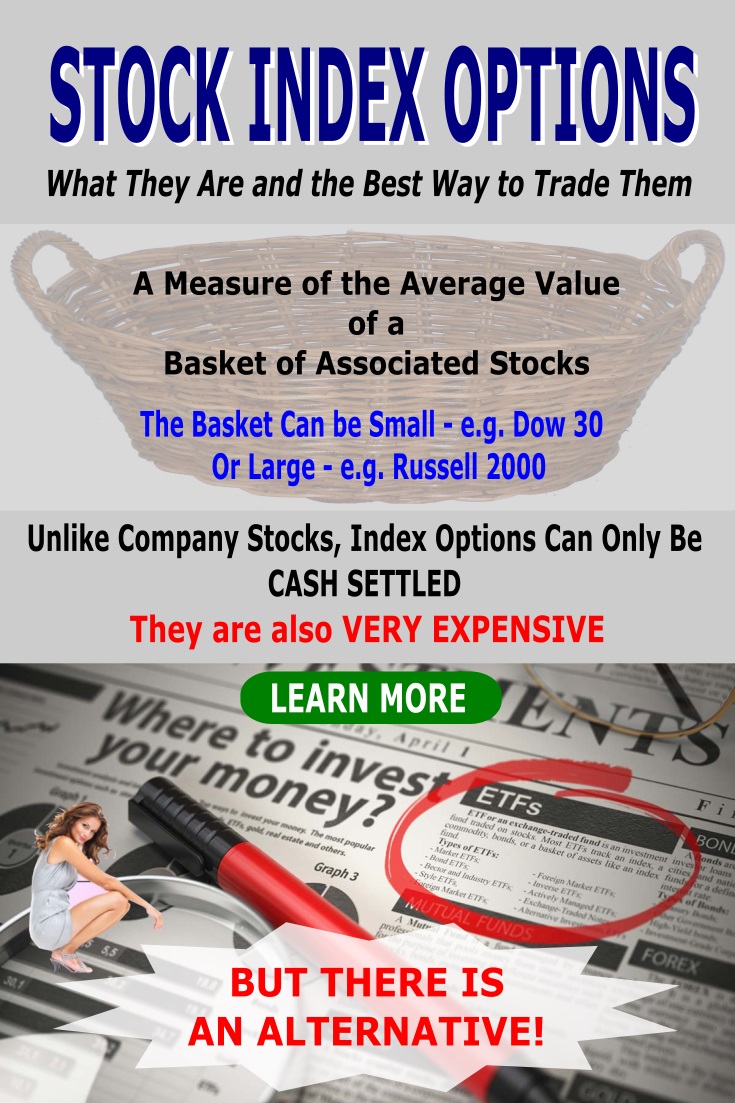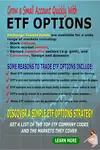Search Options Trading Mastery:
Stock Index Option Trading for Beginners
What a Stock Index Option is and The Best Way to Trade Them
If you're interested in trading a stock index option, it pays to know what they are and how they differ from normal stock options. With that covered, the question remains whether stock index options are really the better alternative to their counterpart - the Exchange Traded Index Fund.
A stock index is a measure of the average value of a basket of associated stocks. Sometimes the basket is quite small, such as the Dow Jones Index, which includes only 30 major stocks. On the other hand, some indexes are quite large, such as the Russell 3000 - the number being indicative of how many stocks are included.
These are called "broad-based" indexes. Other indexes cover industry groups such as mining, energy, utilities, financial and resources markets and are called "narrow-based" indexes.
For option trading purposes though, the thing about stock indexes, is that an index is not something that can be physically delivered to you like company shares can.
So if the time comes when you choose to exercise a stock index option, the only way it can be settled is by receiving the cash value of the index at exercise date, multiplied by 100 (because one option contract covers 100 of the underlying asset).
A stock index option is known as a financial derivative because it derives it value from the index itself. The beauty of an option contract is, that it allows you to purchase or sell rights to the changing value of the index without having to shell out the full value of the index trading price. This is called "leverage".
Take the Dow Jones for example. If it's trading at 12,000 points then you may not be able to afford to buy 1 unit at that price, but you may have enough to purchase a call or put option on the Dow. But as we shall see, there is an even better alternative to this.
A call option gives you the right to buy the index at a specified price up to an agreed expiration date.
A put option gives you the right to sell the index under the same conditions as for calls.
If you can buy cheaper when the trading price is higher, you make a profit. If you can sell for more, when the trading price is lower, you also make a profit.
The only thing to bear in mind is, that although stock index values change throughout the trading day, stock index options only change in value at the end of the trading day, so are not suitable for intraday trading. But there is an alternative.
Stock Index Option Alternative
Enter the Exchange Traded Funds (ETFs). These are large fund managers, who purchase the basket of underlying stocks that make up the index. The index therefore becomes a reflection of the value of the fund. You can purchase shares in the fund and theoretically, your share value will change in accordance with the changing value of the underlying index.
But ETFs also offer options on their shares. Because the ETF share price moves in alignment with the index, option contracts on ETF shares become a defacto way of trading the index option.
Since the share price of the ETF is about 100th of the value of the index, the options on ETFs are much cheaper than the stock index option itself - and yet yield the same results.
Some of the more well known Exchange Traded (Index) Funds are:
- QQQ - reflects the Nasdaq 100
- SPY - reflects the S&P 500
- DIA - reflects the Dow Jones Industrial Average
- EEM - reflects the emerging markets index
- IWM - reflects the Russell 2000 index
All the above have greater liquidity and much more flexibility than trading the stock option itself. Some of the best option trading strategies such as the Trading Pro System have been created with stock indexes in mind.
**************** ****************
Return to Index Options Contents Page
Go to Option Trading Homepage















New! Comments
Have your say about what you just read! Leave me a comment in the box below.